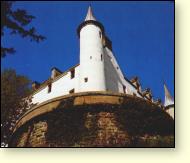
 |
|
Location: Brora, Sutherland KW9 6LR
Hours: 9.30am - 4.00pm, Mon - Fri
Group bookings by appointment
Reception centre and shop
Phone: 01408-621444/621033
Fax: 01408-621131
|
The River Brora has a reputation for fine salmon and the town of the same name has an attractive little harbour. Brora is a small resort now but in 1529 they opened a coalmine (the only one in the Highlands) and in the 17th century a saltworks was set up. The brickworks got going in 1818, just a year before the distillery. Successive Earls of Sutherland, the local lairds in their castle at Golspie, saw to it that Brora was always a working town. Then they changed tack and evicted just about everyone from the entire county and put in sheep instead – the infamous Highland Clearances. Such was the extent of their landownership, that the Sutherlands were able to empty 500,000 acres of 15,000 people; in a single night in 1819, the year that the distillery was built, 250 crofts were burned.
Just as there were two locations in the story of Balblair at Edderton, Clynelish is the latterday form of a separate distillery set up in 1819 by the Marquis of Stafford (later Duke of Sutherland). Hence, most of the history belongs to the original distillery, which was renamed Brora, when the new structure built alongside took over the Clynelish name.
The new Clynelish went into production in 1967. It is attractive in the modern way, but anonymous. Land from Clynelish Farm was acquired and water supplies were augmented from the Clynemilton Burn.
The new Clynelish is three times the size of the original and has three pairs of stills. It very much continues the tradition of the original Clynelish
The Whisky
Distilleries do not need to be old to produce good whisky and with modern technology nothing need be left to chance. Clynelish is one of the most powerful Highland malts with a rich, salty earthiness more readily associated with Island styles. This is often attributed to the proximity of the sea, but what about the shoreline malts – Glenmorangie, Oban and others – which show no marine characteristics? This is all part of the mystery of malt whisky.
Available at 14 years and 43% vol. as well as cask-strength 1972 vintage, 12- and 20-year-old from independents, and exported as a 22 year old Rare Malt at 58.6% alc.
Source of water
Clynmilton Burn
Of interest

Set in delightful gardens on a rocky outcrop, the castle at Dunrobin has a Disneyesque appeal.
|
· Dunrobin Castle is the seat of the Dukes of Sutherland, set on a raised rock pedestal. A 13th-century keep lies within the 19th-century, French-inspired outer; the rooms are sumptuously decorated and full of Louis XV furniture. The gardens are based on those at Versailles.
· Carn Liath Broch lies north of Dunrobin, a well-preserved example of the round towers, usually with stairways in hollow walls, that are among the few tangible legacies of the Picts.